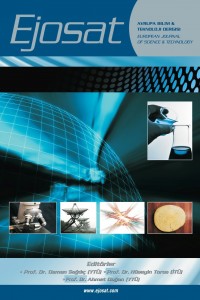The world's best destination biochemical insight into the Turkish cuisine: Some traditional foods and B vitamins compositions
Abstract
There is a relationship between the vitamin amount of the currently serving traditional Turkish cuisine compositions and values that should be taken daily. In this study, some traditional food types were prepared in laboratory and analyzed by means of HPLC (High Performance Liquid Chromatography) so as to examine this relationship. By analytical method used, some water-soluble vitamins simultaneous identification by doing, spesific for amount of quantification, robust and efficient in terms of time was shown. For each sample, composition of thiamine, riboflavin, nicotinic acid, nicotinamide, pyridoxine (PN), pyridoxal (PL) and pyridoxamine (PM) was analyzed and results were expressed as a micrograms (µg), sensetively. Vitamin B compositions are among the antioxidants that have a strong activity against oxidative damage to tissues. Furthermore, it also plays an important role in carbohydrate and energy metabolism.
The main purpose of this paper, find the values of some types of traditional foods consumed in daily life in order to find as a microgram of B vitamins in 1 portion. At the same time, to provide the daily vitamin B requirements as percentage. As a result of analyzes, mercimek köftesi has the highest B₁ and B₂ amounts were 299.20 µg/portion and 364.32 µg/portion respectively. The highest vitamin B₃ containing meal is zeytinyağlı yaprak sarma with 1030.4 µg/portion and lastly the highest vitamin B₆ containing meal is found in Kayseri mantı with 623.0 µg/portion. The ratios of 1 portion of meals to cover our daily vitamin B requirements are as follows: Kayseri mantı; B₁ 8.75%, B₂ 10.3% B₃ 4.70%, B₆ 47.9%, lahmacun; B₁ 16.5%, B₂ 7.38%, B₃ 1.55%, B₆ 26.5%, zeytinyağlı yaprak sarma; B₁ 3.60%, B₂ 7.87%, B₃ 7.33%, B₆ 6.86% and mercimek köftesi; B₁ 24.9%, B₂ 28.0%, B₃ 3.44%, B₆ 24.1%.
References
- Barut, İ. 2016. Niasin (B3) Vitamininin Yağ Grefti Sağ Kalımı Üzerine Etkisi. Gazi Üniversitesi, Tıp Fakültesi, Uzmanlık Tezi, 110s, Ankara.
- Bingöl, G. 1977. Vitaminler ve Enzimler. Ankara Üniversitesi, Eczacılık Fakültesi Yayınları, Ders Kitabı Serisi, 90s, Ankara.
- Boyacı, B.B. 2008. Zenginleştirilmiş Unlardan Farklı Koşullarda Üretilen Ekmeklerin Bazı B Vitamini İçeriklerinin İncelenmesi. Hacettepe Üniversitesi, Fen Bilimleri Enstitüsü, Doktora Tezi, 148s, Ankara.
- Demirci, M. 2014. Beslenme, Gıda Teknoloji Derneği Yayınları, (5. Baskı) 370s, Tekirdağ
- Ertaş, Y., Gezmen, M. 2013. Sağlıklı beslenmede Türk mutfak kültürünün yeri. Gümüşhane Üniversitesi Sağlık Bilimleri Dergisi 2(1), 117-136.
- Esteve, M. J., Farré, R., Frígola, A., García-Cantabella, J. M. 2001. Simultaneous determination of thiamin and riboflavin in mushrooms by liquid chromatography. Journal of Agricultural and Food Chemistry, 49(3), 1450-1454.
- Güngör, K. 2003. Vitamin ve minerallerin dişhekimliğindeki önemi. Gazi Üniversitesi Diş Hekimliği Fakültesi Dergisi, 20(3), 51-56.
- Kızıldemir, Ö. Öztürk, E., Sarıışık, M. 2014. Türk mutfak kültürünün tarihsel gelişiminde yaşanan değişimler. Abant İzzet Baysal Üniversitesi Sosyal Bilimler Enstitüsü Dergisi 14(3), 191-210.
- Ndaw, S., Bergaentzle, M., Aoudé-Werner, D., Hasselmann, C. 2002. Enzymatic extraction procedure for the liquid chromatographic determination of niacin in foodstuffs. Food Chemistry, 78(1), 129-134.
- Sampson, D. A., Eoff, L. A., Yan, X. L., Lorenz, K. 1995. Analysis of free and glycosylated vitamin B6 in wheat by high-performance liquid chromatography. Cereal Chemistry, 72(2), 217-220.
- Samur, G. 2008. Vitaminler Mineraller ve Sağlığımız. Klasmat Matbaacılık, 32s, Ankara.
- Tayar, M. Korkmaz, H.N., Özkeleş, E. 2013. Beslenme İlkeleri. Dora Yayınları, (2.Baskı) 368s, Bursa
Dünyanın En İyi Varış Noktası Türk Mutfağına Biyokimyasal Bakış: Bazı Geleneksel Yemekler ve B Vitamini Kompozisyonları
Abstract
References
- Barut, İ. 2016. Niasin (B3) Vitamininin Yağ Grefti Sağ Kalımı Üzerine Etkisi. Gazi Üniversitesi, Tıp Fakültesi, Uzmanlık Tezi, 110s, Ankara.
- Bingöl, G. 1977. Vitaminler ve Enzimler. Ankara Üniversitesi, Eczacılık Fakültesi Yayınları, Ders Kitabı Serisi, 90s, Ankara.
- Boyacı, B.B. 2008. Zenginleştirilmiş Unlardan Farklı Koşullarda Üretilen Ekmeklerin Bazı B Vitamini İçeriklerinin İncelenmesi. Hacettepe Üniversitesi, Fen Bilimleri Enstitüsü, Doktora Tezi, 148s, Ankara.
- Demirci, M. 2014. Beslenme, Gıda Teknoloji Derneği Yayınları, (5. Baskı) 370s, Tekirdağ
- Ertaş, Y., Gezmen, M. 2013. Sağlıklı beslenmede Türk mutfak kültürünün yeri. Gümüşhane Üniversitesi Sağlık Bilimleri Dergisi 2(1), 117-136.
- Esteve, M. J., Farré, R., Frígola, A., García-Cantabella, J. M. 2001. Simultaneous determination of thiamin and riboflavin in mushrooms by liquid chromatography. Journal of Agricultural and Food Chemistry, 49(3), 1450-1454.
- Güngör, K. 2003. Vitamin ve minerallerin dişhekimliğindeki önemi. Gazi Üniversitesi Diş Hekimliği Fakültesi Dergisi, 20(3), 51-56.
- Kızıldemir, Ö. Öztürk, E., Sarıışık, M. 2014. Türk mutfak kültürünün tarihsel gelişiminde yaşanan değişimler. Abant İzzet Baysal Üniversitesi Sosyal Bilimler Enstitüsü Dergisi 14(3), 191-210.
- Ndaw, S., Bergaentzle, M., Aoudé-Werner, D., Hasselmann, C. 2002. Enzymatic extraction procedure for the liquid chromatographic determination of niacin in foodstuffs. Food Chemistry, 78(1), 129-134.
- Sampson, D. A., Eoff, L. A., Yan, X. L., Lorenz, K. 1995. Analysis of free and glycosylated vitamin B6 in wheat by high-performance liquid chromatography. Cereal Chemistry, 72(2), 217-220.
- Samur, G. 2008. Vitaminler Mineraller ve Sağlığımız. Klasmat Matbaacılık, 32s, Ankara.
- Tayar, M. Korkmaz, H.N., Özkeleş, E. 2013. Beslenme İlkeleri. Dora Yayınları, (2.Baskı) 368s, Bursa
Details
| Primary Language | Turkish |
|---|---|
| Subjects | Engineering |
| Journal Section | Articles |
| Authors | |
| Publication Date | August 31, 2019 |
| Published in Issue | Year 2019 Issue: 16 |


